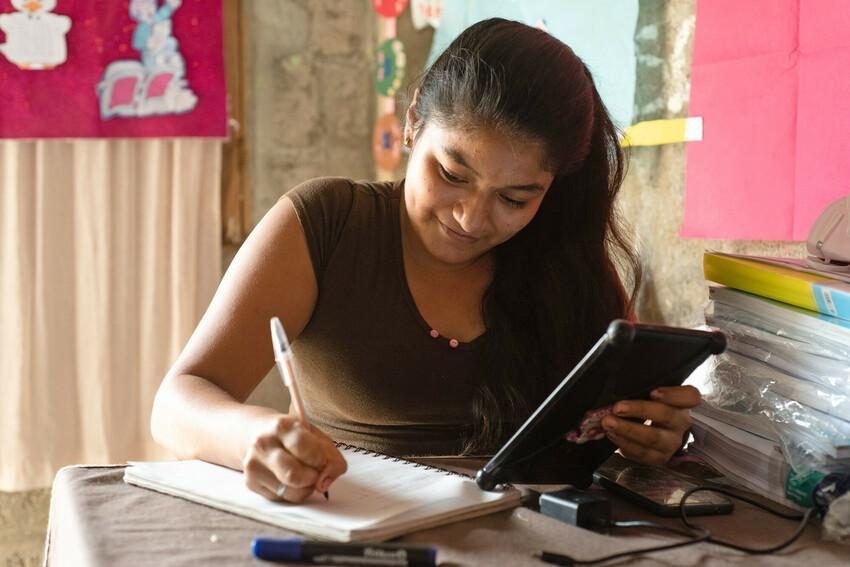COVID-19 has smashed the status quo: young people must now raise their voices in digital decision-making spaces.
A blog by Grace Hunt and Florence Waller-Carr.

Young people, in particular girls in all their diversity, have the right to participate in decision making.
This means having meaningful engagement with power holders in the formal spaces of power where decisions are being made about girls and their lives, from local government to the United Nations.
But access to these spaces has not always been possible. Access to power has historically been exclusionary, to women, young people and marginalised groups especially.
Facilitating young people’s access to these spaces and ensuring that their participation is meaningful – that their voice has value and is listened to and acted upon – requires a redistribution of power.
COVID-19 and the shattering of power structures
COVID-19 has directly impacted how power manifests and how it is accessed. Many powerful organisations are turning to digital engagement formats such as webinars, online meetings and social media to carry out their work.
This moment could, in fact, provide an opportunity for transformation and the reimagining of power.
Despite the challenges of COVID-19, this moment could, in fact, provide an opportunity for transformation and the reimagining of power – not least due to the increasing use of digital methods.
But are established, more traditional power-holders adapting to the ‘new normal’? Are they being flexible and creative enough? Is there now a vital opportunity for youth advocacy groups to claim power and get their voices heard?
COVID-19 and youth organising
The introduction of emergency measures and lockdowns across the world have closed civic space and stopped young people physically getting together to organise, but it has not stopped their efforts to create change – it has just moved them online.
For example, in Malaysia, youth groups in the country have been growing angry at the fact that the lower house of the Parliament, Dewan Rakyat, has not gathered for more than one day this year. They have been urging the government to schedule Parliament sittings to discuss the pressing issues facing young people in education and work.
So, four separate groups, Undi18, Challenger Malaysia, United Nations Association of Malaysia (Unam) Youth and Liga Rakyat Demokraktik (LRD) joined forces to orchestrate a virtual Parliament.
Over 4th and 5th July, the Parliamen Digital involved an impressive 222 young people from across Malaysia, selected from a pool of over 2,500 applicants. Voting and passing of bills was simulated and systems were in place for debate and questions, demonstrating how “democracy can be digitised”.
[Pictured above, Marscella Ling, 15, the youngest representative of the Digital Parliament.] ⠀
This organisational feat demonstrates the youth groups’ drive to ensure democratic processes continue despite the pandemic and, perhaps more importantly, it shows what youth dominated spaces of power can achieve. Impressively, Parliamen Digital achieved a better gender balance that Malaysia’s actual lower Parliament which they sought to reflect, with 30% of participants being women.
These youth groups have proven their ability and eagerness to adapt, characteristics that traditional spaces of power can lack.
Youth voices must speak up and help create the new normal
As in Malaysia, youth advocates globally must continue to campaign for their right to engage in decision-making. The pandemic must not be a barrier for youth voices. This time of disruption must instead be a time for youth voices to rise up and claim power.
Those already granted power must hear a wide array of voices.
And while there is a golden opportunity for youth voices to be heard louder than before, digital participation will unfortunately still be a barrier for some. Many marginalised young people don’t have access to digital infrastructure for participation. There is also a substantial digital gender gap in access to technology and the internet. And girls and marginalised groups are some of the people powerholders need to listen to the most.
That’s why this work is not solely for the youth to carry out. Those already granted power must hear a wide array of voices. They must look at the youth climate strikes and Black Lives Matter protests and see that young people are in fact vital sources of creativity and energy with a desire for change. That today’s young people thought-leaders have much to say.
Let’s hope those with power will listen.
Girls Get Equal Youth Toolkit
Visit the new Girls Get Equal youth toolkit for tips and resources for gender equality campaigners.